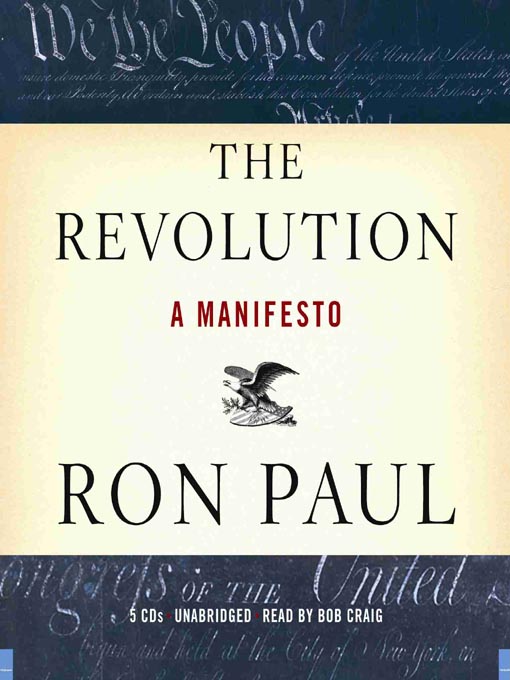
The Revolution
A Manifesto
کتاب های مرتبط
- اطلاعات
- نقد و بررسی
- دیدگاه کاربران
نقد و بررسی

In 1988, while remaining a Republican, Texas Congressman Ron Paul ran for president as the nominee of the Libertarian Party. In 2008 he ran in the Republican primary, arousing a lot of interest but losing to John McCain. In this book he argues that if the United States continues exercising extra-constitutional foreign and domestic policies, we will suffer bankruptcy and possible social collapse. Bob Craig is a convincing, low-key narrator for this sort of thing. His mature, low baritone is articulate, gentle, persuasive, calm, and orderly. There is intensity, but it's mostly in the writing, and even then the combination of author and narrator is soothing, rather than exciting. No rabble-rousing here, just rational common sense. D.R.W. (c) AudioFile 2008, Portland, Maine

April 28, 2008
Congressman, Republican Presidential candidate and author Paul (A Foreign Policy of Freedom) says "Let the revolution begin" with this libertarian plea for a return to "the principles of our Founding Fathers: liberty, self-government, the Constitution, and a noninterventionist foreign policy." Specific examples demonstrate how far U.S. law has strayed from this path, particularly over the past century, as well as Paul's firm grasp of history and dedication to meaningful debate: "it is revolutionary to ask whether we need troops in 130 countries... whether the accumulation of more and more power in Washington has been good for us...to ask fundamental questions about privacy, police-state measures, taxation, social policy." Though he can rant, Paul is informative and impassioned, giving readers of any political bent food for thought. With harsh words for both Democrats and Republicans, and especially George W. Bush, Paul's no-nonsense text questions the "imperialist" foreign policy that's led to the war in Iraq ("one of the most ill considered, poorly planned, and... unnecessary military conflicts in American history"), the economic situation and rampant federalism treading on states' rights and identities ("The Founding Fathers did not intend for every American neighborhood to be exactly the same"). Though his policy suggestions can seem extreme, Paul's book gives new life to old debates.

April 28, 2008
The U.S. is cartwheeling into a self-destructive catastrophic calamity, and despite what everyone else says about how to solve it, Paul believes he knows the real truth that can save us. The one-time presidential hopeful's goal, to drastically reduce government and thus give us the true sense of freedom that the Constitution's framers meant, is oversimplified in a country of more than 300 million residents. Certainly, his critique of current politics is sound and well felt, but the plans of this Republican pol, who praises Robert Taft in every other sentence, are anything but revolutionary. Bob Craig provides a deliberate and elderly tone that can be emphatic without being overbearing, which matches well with the text and Paul himself. However, the production contains a surprising amount of background noise that reveals sloppy work on the sound editor's behalf. A Grand Central hardcover.

May 19, 2008
Congressman, Republican Presidential candidate and author Paul (A Foreign Policy of Freedom) says "Let the revolution begin" with this libertarian plea for a return to "the principles of our Founding Fathers: liberty, self-government, the Constitution, and a noninterventionist foreign policy." Specific examples demonstrate how far U.S. law has strayed from this path, particularly over the past century, as well as Paul's firm grasp of history and dedication to meaningful debate: "it is revolutionary to ask whether we need troops in 130 countries... whether the accumulation of more and more power in Washington has been good for us...to ask fundamental questions about privacy, police-state measures, taxation, social policy." Though he can rant, Paul is informative and impassioned, giving readers of any political bent food for thought. With harsh words for both Democrats and Republicans, and especially George W. Bush, Paul's no-nonsense text questions the "imperialist" foreign policy that's led to the war in Iraq ("one of the most ill considered, poorly planned, and... unnecessary military conflicts in American history"), the economic situation and rampant federalism treading on states' rights and identities ("The Founding Fathers did not intend for every American neighborhood to be exactly the same"). Though his policy suggestions can seem extreme, Paul's book gives new life to old debates.
Copyright 2008 Library Journal, LLC Used with permission.

























دیدگاه کاربران